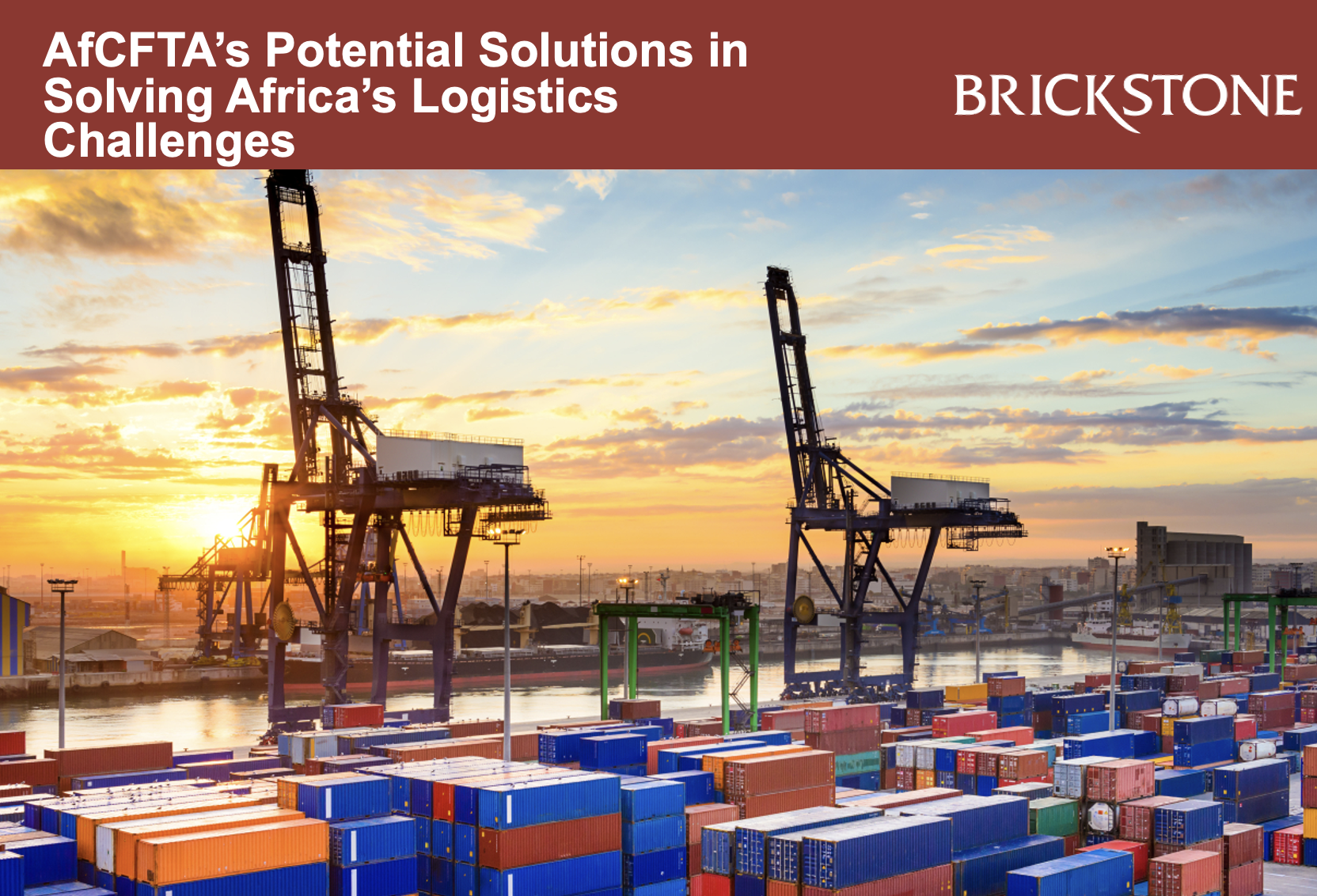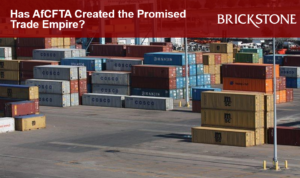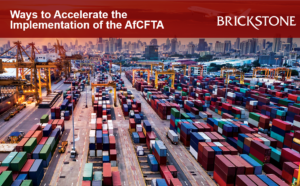AfCFTA’s Potential Solutions in Solving Africa’s Logistics Challenges
Africa has become a thriving continent for business in recent years but the logistics and supply chain industry continues to play catch up. According to Business Day, the challenges facing Africa’s logistics such as high cost of moving goods within the continent, inadequate transport infrastructure and lack of regulatory frameworks have led to inefficiencies in the supply chain.
As nations within the continent begin with implementation of the African Continental Free Trade Area (AfCFTA), there is potential for the logistics and supply chain industry to thrive and boost intra-African trade, provided it is pumped with more finance, customs cooperation and requisite infrastructure.
This article by Brickstone Africa reviews various publications on the impact AfCFTA in solving Africa’s logistics challenges.
AfCFTA and Africa’s Logistics Challenges
With its diverse landscapes, unique wildlife, and vast mineral resources, Africa has the potential to be a major player in the global economy. The Continent, however, faces some major logistics challenges that need to be addressed to stop the hemorrhaging of economic growth and social welfare. This includes poor infrastructure, limited access to finance, political instability, fragmentation of markets, and lack of skilled workforce.
Intra-African trade is merely 13 percent which is low when compared to intra-regional trade achieved by Europe at 60 percent, North America at 40 percent, and Asia at 30 percent. The reason for low intra-African trade is attributed to the poor quality of roads and weak transport infrastructure amidst protectionist trade policies.
Accordingly, AU asserts that these challenges have long hindered intra-African trade. Countries face high custom delay periods, shortages of paved roads upon which freight can be transported and a higher loss of goods due to limited cold chains compared to other regions globally. And in situations where goods are able to move within the woeful transportation network, the cost is high.
Moreso, according to Business Day, there is a lack of road networks into the sixteen landlocked nations in Africa, and alternative transport options are expensive. The Economist data from last year showed that it cost about US$2,000 to transport a container from China to Beira in Mozambique, while it cost US$5,000 to transport 500 kilometres inland to Malawi.
Amidst this transportation situation, there is the lack of regulatory framework for customs and border crossing in Africa. Intra-African border crossings are known for inefficiencies, delays and corruption due to the long wait and bureaucratic processes at the border.
Meanwhile, logistics relies on information systems and coordination of logistics activities which African nations evidently lack. Some logistics companies in Africa still use manual-based inventory to track goods, monitor and manage distribution. All these challenges negatively impact the logistics industry, little wonder that the 2023 Logistics Performance Index ranked African countries low on performance.
Costs related to logistics can increase the price of goods traded within Africa by up to 75 percent. This is quite alarming, especially as the AfCFTA operational phase has just been launched.
The successful implementation of the African Continental Free Trade Area (AfCFTA) is expected to drive substantial growth in the transport and logistics sector, with projections suggesting an increase in intra-African freight demand by 28%. This could result in a need for nearly 2 million trucks, 100,000 rail wagons, 250 aircraft, and more than 100 vessels by 2030.
The AfCFTA offers a unique opportunity to address the challenges facing Africa’s logistics and supply chain, so that when goods, services and people move within the continent, no exorbitant price will be charged to end users.
Through the years, billions of dollars have gone into interconnecting the continent by expanding existing roads, railways, air and waterways while building new ones. Developing the transport system will significantly reduce the cost of importing, exporting and delivering goods.
With the AfCFTA, member countries can become more committed and strategic towards developing comprehensive transport infrastructure networks. This includes improving road and rail networks, increasing the number of ports and airports, and reducing transit times for goods.
AfCFTA’s Opportunities for Growth in Africa’s Logistics
A recent report by the World Economic Forum highlights the opportunities for growth in the transport and logistics sector that the AfCFTA will open up. The following are the main takeaways from the study:
- Unlocking intraregional trade will skyrocket the demand for logistics, with more small and medium-sized enterprises needing logistics providers to connect to bigger markets. If commodities prices drop due to the removal of trade barriers and import costs, consumption and demand will increase, to the benefit of African manufacturers and the logistics and transport sector.
- Road and maritime freight transportation offer, at present, the biggest opportunity as the infrastructure for air and rail transportation is still being developed.
- There is potential for digital logistics companies to step in and reduce costs, as well as improving the quality of services. One of the prominent players in this field is Nigeria’s Kobo360, which connects truck owners with clients requiring cargo transportation – an Uber for trucks. Other companies with similar business models include Lori Systems and Sendy.
- Closing the urban-rural divide presents significant opportunities for the logistics sector. Inadequate road infrastructure in rural areas can create isolation and challenges for businesses operating there. To address this, start-ups are developing innovative solutions such as cargo drones, inland waterways and ports, and alternative forms of transportation to improve connectivity and accessibility.
- Business-to-business logistics is expected to dominate the sector in the short to medium term. AfCFTA will accelerate opportunities for companies providing B2B services, including those specialising in digital logistics.
- However, business-to-consumer logistics will continue to grow as consumer spending rises, e-commerce becomes more prevalent and urbanisation increases.
Read more here.







